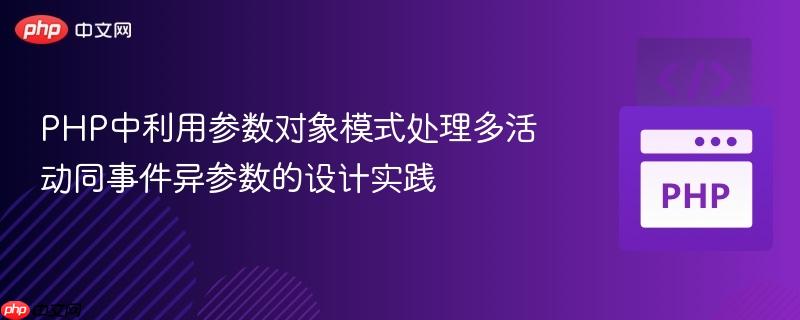
本文探讨了在多个活动或业务场景中,如何优雅地处理具有相同事件名称但需要不同参数集合的问题。通过引入接口、结合参数对象模式,我们能够实现事件方法的统一调用接口,同时允许底层具体实现根据各自需求接收定制化的参数集合,从而提升代码的可维护性、可扩展性和灵活性,避免了冗余的参数列表和复杂的变长参数处理。
在复杂的业务系统中,我们经常会遇到这样的场景:存在多个独立的业务模块(例如不同的营销活动或用户策略),它们都响应相同的核心事件(例如“首次购买”、“首次交易”)。然而,尽管事件名称相同,但每个模块在处理这些事件时,可能需要接收一套完全不同的参数。直接使用接口来强制统一方法签名会导致参数不匹配,而变长参数(...$arguments)虽然灵活,却牺牲了类型安全和代码可读性,并且在实际使用中往往变得复杂。
为了解决这一挑战,我们可以采用一种结合了接口和参数对象(Parameter Object)模式的设计。其核心思想是:
这种方法将变动的参数集合从方法签名中剥离,转移到专门的上下文对象中,从而使方法签名保持稳定和一致,实现了真正的多态。
首先,我们定义活动的通用接口 CampaignInterface,以及针对不同事件的上下文接口 PurchaseContextInterface 和 TradeContextInterface。
立即学习“PHP免费学习笔记(深入)”;
<?php
// 假设 User 和 Model 是已定义的类
class User {}
class Model {}
/**
* 购买事件的上下文接口
*/
interface PurchaseContextInterface
{
// 可以定义一些获取通用参数的方法,例如:
// public function getPurchaseAmount(): float;
}
/**
* 交易事件的上下文接口
*/
interface TradeContextInterface
{
// 可以定义一些获取通用参数的方法,例如:
// public function getTradeType(): string;
}
/**
* 活动通用接口
*/
interface CampaignInterface
{
/**
* 响应首次购买事件
* @param User $user 触发购买的用户
* @param PurchaseContextInterface $context 购买事件的特定上下文数据
*/
public function onFirstPurchase(User $user, PurchaseContextInterface $context): void;
/**
* 响应首次交易事件
* @param TradeContextInterface $context 交易事件的特定上下文数据
*/
public function onFirstTrade(TradeContextInterface $context): void;
}
?>在 CampaignInterface 中,onFirstPurchase 和 onFirstTrade 方法的参数签名是固定的,但通过传入不同的 PurchaseContextInterface 和 TradeContextInterface 实现,我们能够传递不同的业务数据。
接下来,我们创建具体的活动类和它们各自的上下文类。
<?php
// ... (User, Model, interfaces definitions from above)
/**
* 首次活动购买事件的上下文实现
*/
class FirstCampaignPurchaseContext implements PurchaseContextInterface
{
private $arg1;
private $arg2;
public function __construct($arg1, $arg2)
{
$this->arg1 = $arg1;
$this->arg2 = $arg2;
}
public function getArg1() { return $this->arg1; }
public function getArg2() { return $this->arg2; }
}
/**
* 首次活动交易事件的上下文实现
*/
class FirstCampaignTradeContext implements TradeContextInterface
{
private $price;
private $something;
private $model;
public function __construct($price, $something, Model $model)
{
$this->price = $price;
$this->something = $something;
$this->model = $model;
}
public function getPrice() { return $this->price; }
public function getSomething() { return $this->something; }
public function getModel(): Model { return $this->model; }
}
/**
* 首次活动具体实现
*/
class FirstCampaign implements CampaignInterface
{
public function onFirstPurchase(User $user, PurchaseContextInterface $context): void
{
if ($context instanceof FirstCampaignPurchaseContext) {
echo "FirstCampaign: Handling first purchase for user " . get_class($user) . " with arg1: " . $context->getArg1() . ", arg2: " . $context->getArg2() . "\n";
// 具体业务逻辑
} else {
// 处理非预期的上下文类型,或者抛出异常
echo "FirstCampaign: Unexpected purchase context type.\n";
}
}
public function onFirstTrade(TradeContextInterface $context): void
{
if ($context instanceof FirstCampaignTradeContext) {
echo "FirstCampaign: Handling first trade with price: " . $context->getPrice() . ", something: " . $context->getSomething() . ", model: " . get_class($context->getModel()) . "\n";
// 具体业务逻辑
} else {
echo "FirstCampaign: Unexpected trade context type.\n";
}
}
}
?><?php
// ... (User, Model, interfaces definitions from above)
/**
* 第二次活动购买事件的上下文实现
*/
class SecondCampaignPurchaseContext implements PurchaseContextInterface
{
// 第二次活动可能不需要额外的购买参数,或者有不同的参数
public function __construct() {}
}
/**
* 第二次活动交易事件的上下文实现
*/
class SecondCampaignTradeContext implements TradeContextInterface
{
private $model;
public function __construct(Model $model)
{
$this->model = $model;
}
public function getModel(): Model { return $this->model; }
}
/**
* 第二次活动具体实现
*/
class SecondCampaign implements CampaignInterface
{
public function onFirstPurchase(User $user, PurchaseContextInterface $context): void
{
// 第二次活动可能只需要用户信息,不需要额外的购买上下文数据
echo "SecondCampaign: Handling first purchase for user " . get_class($user) . "\n";
// 具体业务逻辑
}
public function onFirstTrade(TradeContextInterface $context): void
{
if ($context instanceof SecondCampaignTradeContext) {
echo "SecondCampaign: Handling first trade with model: " . get_class($context->getModel()) . "\n";
// 具体业务逻辑
} else {
echo "SecondCampaign: Unexpected trade context type.\n";
}
}
}
?><?php
// ... (User, Model, interfaces definitions from above)
/**
* 第三次活动购买事件的上下文实现
*/
class ThirdCampaignPurchaseContext implements PurchaseContextInterface
{
private $model;
private $abc;
public function __construct(Model $model, int $abc)
{
$this->model = $model;
$this->abc = $abc;
}
public function getModel(): Model { return $this->model; }
public function getAbc(): int { return $this->abc; }
}
/**
* 第三次活动交易事件的上下文实现
*/
class ThirdCampaignTradeContext implements TradeContextInterface
{
// 第三次活动可能不需要交易事件的额外参数
public function __construct() {}
}
/**
* 第三次活动具体实现
*/
class ThirdCampaign implements CampaignInterface
{
public function onFirstPurchase(User $user, PurchaseContextInterface $context): void
{
if ($context instanceof ThirdCampaignPurchaseContext) {
echo "ThirdCampaign: Handling first purchase for user " . get_class($user) . ", model: " . get_class($context->getModel()) . ", abc: " . $context->getAbc() . "\n";
// 具体业务逻辑
} else {
echo "ThirdCampaign: Unexpected purchase context type.\n";
}
}
public function onFirstTrade(TradeContextInterface $context): void
{
// 第三次活动可能不需要交易事件的额外参数
echo "ThirdCampaign: Handling first trade.\n";
// 具体业务逻辑
}
}
?>在应用程序的不同部分,当某个事件发生时,我们可以根据当前活动的类型,创建相应的上下文对象,然后调用统一的事件处理方法。
<?php
// ... (All class and interface definitions from above)
// 模拟事件触发
function triggerFirstPurchase(CampaignInterface $campaign, User $user, PurchaseContextInterface $context): void
{
$campaign->onFirstPurchase($user, $context);
}
function triggerFirstTrade(CampaignInterface $campaign, TradeContextInterface $context): void
{
$campaign->onFirstTrade($context);
}
// 实例化用户和模型
$user = new User();
$model = new Model();
// 第一次活动
$firstCampaign = new FirstCampaign();
$firstPurchaseContext = new FirstCampaignPurchaseContext('value1', 'value2');
$firstTradeContext = new FirstCampaignTradeContext(100.50, 'some_data', $model);
echo "--- Triggering First Campaign Events ---\n";
triggerFirstPurchase($firstCampaign, $user, $firstPurchaseContext);
triggerFirstTrade($firstCampaign, $firstTradeContext);
echo "\n";
// 第二次活动
$secondCampaign = new SecondCampaign();
$secondPurchaseContext = new SecondCampaignPurchaseContext(); // 无需额外参数
$secondTradeContext = new SecondCampaignTradeContext($model);
echo "--- Triggering Second Campaign Events ---\n";
triggerFirstPurchase($secondCampaign, $user, $secondPurchaseContext);
triggerFirstTrade($secondCampaign, $secondTradeContext);
echo "\n";
// 第三次活动
$thirdCampaign = new ThirdCampaign();
$thirdPurchaseContext = new ThirdCampaignPurchaseContext($model, 123);
$thirdTradeContext = new ThirdCampaignTradeContext(); // 无需额外参数
echo "--- Triggering Third Campaign Events ---\n";
triggerFirstPurchase($thirdCampaign, $user, $thirdPurchaseContext);
triggerFirstTrade($thirdCampaign, $thirdTradeContext);
?>通过这种方式,事件触发者只需要知道 CampaignInterface 和相应的上下文接口,而无需关心具体活动需要哪些参数。当需要添加新的活动或修改现有活动的事件参数时,只需创建新的上下文类或修改现有上下文类,而无需改动 CampaignInterface 或其他活动的实现,这符合开闭原则。
通过巧妙地结合接口和参数对象模式,我们为处理多活动同事件异参数的问题提供了一个优雅且健壮的解决方案。这种设计不仅提升了代码的清晰度和可维护性,更重要的是,它为系统带来了卓越的扩展性,使得在不断变化的业务需求面前,代码结构依然能够保持稳定和灵活。在设计复杂的事件驱动系统时,这种模式是一个值得深入考虑的有力工具。
以上就是PHP中利用参数对象模式处理多活动同事件异参数的设计实践的详细内容,更多请关注php中文网其它相关文章!

PHP怎么学习?PHP怎么入门?PHP在哪学?PHP怎么学才快?不用担心,这里为大家提供了PHP速学教程(入门到精通),有需要的小伙伴保存下载就能学习啦!

Copyright 2014-2025 https://www.php.cn/ All Rights Reserved | php.cn | 湘ICP备2023035733号